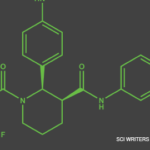Interpretation & Future Steps

Dr. Banerjee
“This is a landmark study in ANCA-associated vasculitis, which is probably going to change our practice in terms of glucocorticoid use,” Dr. Banerjee underscores. “Avacopan will potentially replace glucocorticoids in induction regimens for ANCA-associated vasculitis.”
However, some caveats and questions remain. Dr. Banerjee points out that avacopan also needs to be studied in certain patient groups excluded from the current study, such as those with alveolar hemorrhage, those on ventilation support and those who have recently received plasmapheresis.
Dr. Jayne notes that some have criticized the study for not employing maintenance rituximab. But at the time the trial was designed, maintenance rituximab was not standard of care. “Most of the differentiation between avacopan and the steroid group happened in the second six months, when the rituximab effect would have been wearing off and when the steroids were stopped,” he adds. “Essentially, those patients were on nothing for the second part of the study. But on the other hand, that did demonstrate the effectiveness of avacopan.”
Dr. Jayne also notes that many questions remain about how the drug may best be used. “Should you just carry on the avacopan long term to help prevent relapse?,” he asks. “We don’t know.” It will require further study to see if the drug might be used in this context in addition to, or in place of, rituximab.
We don’t know definitively that it would be safe to stop avacopan at six months or a year for patients receiving fixed-interval rituximab, Dr. Jayne explains. One theoretical problem with using a complement inhibitor is that complement levels in the blood (including C5a) remain high. It’s not known if removing avacopan when the patient is in remission might trigger a disease flare. From a commercial perspective, the drug may be limited to a one-year license, at least initially, because that was the trial’s duration.
Additionally, researchers will work to understand why some patients didn’t go into remission with avacopan. Although some may have had irreversible disease, some might have responded to more potent blocking of the complement system or perhaps to blocking of other parts of the pathway.
Dr. Banerjee notes the promising trial results will likely encourage further studies investigating other complement-blocking agents in ANCA-associated vasculitis. For example, one ongoing study is testing IFX-1, an intravenously administered monoclonal antibody against C5a, in ANCA-associated vasculitis.6
Dr. Jayne also hopes to explore the drug’s potential in treating lupus nephritis. He and his team have already designed a trial for patients with severe renal disease from ANCA-associated vasculitis, patients with the highest risk of renal failure and death who are currently very difficult to treat. “I think this drug may hold a real hope for [these patients to see] more rapid recovery of their kidneys and avoid dialysis.”



